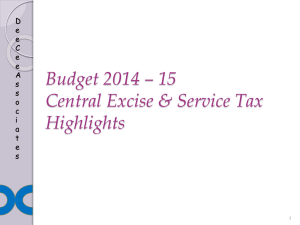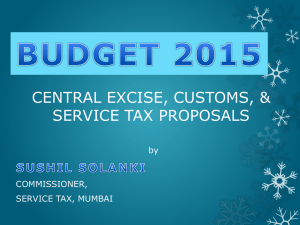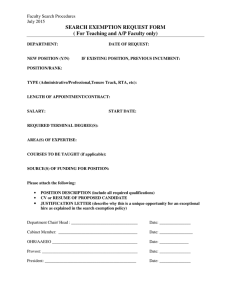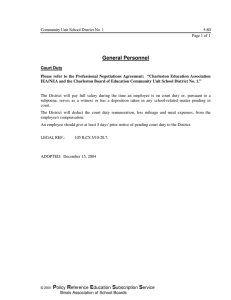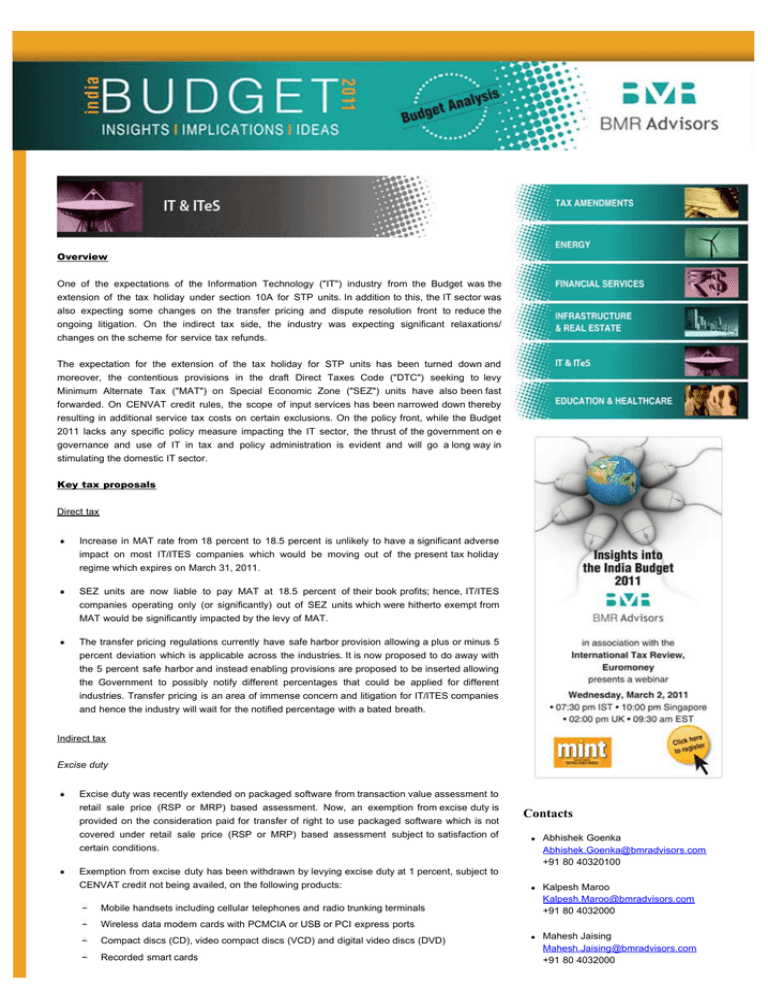
Overview
One of the expectations of the Information Technology ("IT") industry from the Budget was the
extension of the tax holiday under section 10A for STP units. In addition to this, the IT sector was
also expecting some changes on the transfer pricing and dispute resolution front to reduce the
ongoing litigation. On the indirect tax side, the industry was expecting significant relaxations/
changes on the scheme for service tax refunds.
The expectation for the extension of the tax holiday for STP units has been turned down and
moreover, the contentious provisions in the draft Direct Taxes Code ("DTC") seeking to levy
Minimum Alternate Tax ("MAT") on Special Economic Zone ("SEZ") units have also been fast
forwarded. On CENVAT credit rules, the scope of input services has been narrowed down thereby
resulting in additional service tax costs on certain exclusions. On the policy front, while the Budget
2011 lacks any specific policy measure impacting the IT sector, the thrust of the government on e
governance and use of IT in tax and policy administration is evident and will go a long way in
stimulating the domestic IT sector.
Key tax proposals
Direct tax
Increase in MAT rate from 18 percent to 18.5 percent is unlikely to have a significant adverse
impact on most IT/ITES companies which would be moving out of the present tax holiday
regime which expires on March 31, 2011.
SEZ units are now liable to pay MAT at 18.5 percent of their book profits; hence, IT/ITES
companies operating only (or significantly) out of SEZ units which were hitherto exempt from
MAT would be significantly impacted by the levy of MAT.
The transfer pricing regulations currently have safe harbor provision allowing a plus or minus 5
percent deviation which is applicable across the industries. It is now proposed to do away with
the 5 percent safe harbor and instead enabling provisions are proposed to be inserted allowing
the Government to possibly notify different percentages that could be applied for different
industries. Transfer pricing is an area of immense concern and litigation for IT/ITES companies
and hence the industry will wait for the notified percentage with a bated breath.
Indirect tax
Excise duty
Excise duty was recently extended on packaged software from transaction value assessment to
retail sale price (RSP or MRP) based assessment. Now, an exemption from excise duty is
provided on the consideration paid for transfer of right to use packaged software which is not
covered under retail sale price (RSP or MRP) based assessment subject to satisfaction of
certain conditions.
Exemption from excise duty has been withdrawn by levying excise duty at 1 percent, subject to
CENVAT credit not being availed, on the following products:
Mobile handsets including cellular telephones and radio trunking terminals
Contacts
Abhishek Goenka
Abhishek.Goenka@bmradvisors.com
+91 80 40320100
Kalpesh Maroo
Kalpesh.Maroo@bmradvisors.com
+91 80 4032000
Wireless data modem cards with PCMCIA or USB or PCI express ports
Compact discs (CD), video compact discs (VCD) and digital video discs (DVD)
Recorded smart cards
Mahesh Jaising
Mahesh.Jaising@bmradvisors.com
+91 80 4032000
Rate of excise duty has been reduced to 5 percent on the following products
Parts of optical disc drives like DVD drive, DVD writer, Combo drive, CD-ROM drive
Parts of inkjet and laser-jet printers
Light emitting diodes (electroluminescent) imported for manufacture of LED lights or
fixtures
Excise duty at 4 percent was imposed on microprocessors, floppy discs, hard disks, CD-ROM
drives, DVD drives/writers, flash memory, combo drive which was "meant for external use with
a computer or laptop as a plug-in device" during the Budget 2010. The said rate has been
increased to 5 percent.
Exemption on excise duty on above products when they are "meant for fitment inside a CPU
housing/ laptop body" has been withdrawn and 5 percent excise duty has been imposed.
Customs duty
Full exemption from Basic Customs Duty ("BCD") was earlier provided to parts, components for
manufacture of battery chargers and hands-free headphones of mobile handsets including
cellular phones. This has been extended to the following:
Parts and components of PC connectivity cable imported for manufacture of parts of
mobile handsets including cellular phones
Subparts of parts and components of battery chargers, hands free head phones and PC
connectivity cable of mobile handsets including cellular phones
Exemption from Special Additional Duty ("SAD") for the following products:
Parts of inkjet and laser jet printers
Parts of optical disc drives like DVD Drive or DVD Writer, Combo Drives, CD-ROM Drives
Light emitting diodes (electroluminescent) imported for manufacture of LED lights or
fixtures
Exemption from SAD available on "parts, components and accessories imported for
manufacture of mobile handsets" was earlier available only till March 31, 2011, which is now
extended upto March 31, 2012.
The list of specified raw materials and capital goods used in electronics/ IT industry, on which
customs duty exemption is available, has been expanded to include few more items.
Customs duty (ie, CVD) was recently extended on packaged software from transaction value
assessment to retail sale price (RSP or MRP) based assessment. Now, an exemption from
customs duty is provided on the consideration paid for transfer of right to use packaged
software which is not covered under retail sale price (RSP or MRP) based assessment subject
to satisfaction of certain conditions.
Service tax
Exemption/ refund scheme for service tax paid by SEZ developers/ unit on input services
undergoes drastic changes:
Upfront exemption for services "wholly consumed" and refund for services not "wholly
consumed" continues
Parameters for determining "wholly consumed" now defined and aligned to Export Rules
For services falling under Rule 3(1)(iii) of Export Rules (ie, recipient based services), the
condition for qualifying as "wholly consumed" and consequently an upfront exemption is
that the entity should not carry out any other business other than operations in the SEZ
Refund for services not "wholly consumed" to be claimed proportionate to turnover in SEZ
to the total turnover of the company
CENVAT credit
Definition of "input services" amended to specifically exclude rent-a-cab services and other
input services used primarily for personal use or consumption of any employee like outdoor
catering, health services, life insurance, club membership, travel benefits extended to
employees on vacation, etc.
Explanation inserted to the definition of "exempted service" to include "trading". Thus, setting at
rest the debate on availment of CENVAT credit by a service provider cum trader and laying
down clear parameters for computing credit.
Taxable services provided to an SEZ unit / developer without payment of service tax treated as
"zero rated" and restrictions relating to "exempt services" not to apply.
BMR comments
In summary, for the IT Sector, the budget proposals bring nothing to cheer about. The Finance
Minister has hit the final nail in the coffin by refusing to extend the tax holiday for STP units. The
thinking of the government as evidenced by the provisions of the DTC and the Budget indicates a
clear and continuing policy shift away from profit linked incentives. Increase in the MAT rate and
extension of the same to SEZ units is also a clear indicator of directional movement towards an
effective tax rate of 20 percent as envisaged in the DTC.
On indirect tax front as well, the expectations on certain rationalization measures with respect to
service tax refunds were not really met and to the contrary, service tax refunds for SEZs has
undergone a significant change. The exclusions under "input service" definition under CENVAT Rules
not only result in additional cost as credit is not available, but also bring out a requirement of detailed
verification of claiming credit by making such exclusions.
Further, the indirect taxes applied to software remain a puzzle for most software players, who have
seen changes under central excise and service tax almost every six months since 2008, apart from
an additional levy of VAT, which continues to be the bone of contention for this industry.
© Copyright 2011, BMR Advisors. All Rights Reserved
Disclaimer: This newsletter has been prepared for clients and firm personnel only. It provides general information and guidance as on date of preparation and
does not express views or expert opinions of BMR Advisors. The newsletter is meant for general guidance and no responsibility for loss arising to any person acting
or refraining from acting as a result of any material contained in this newsletter will be accepted by BMR Advisors. It is recommended that professional advice be
sought based on the specific facts and circumstances. This newsletter does not substitute the need to refer to the original pronouncements.

